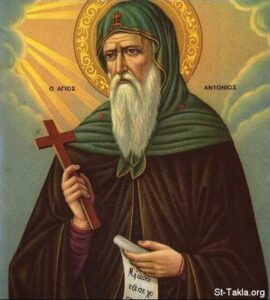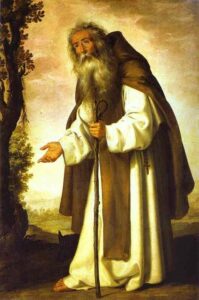Saint Abba Anthony, The Great – Jan 18 Father of Monasticism

Anthony was born to wealthy and noble, pious, and well-to-do Christian parents of illustrious lineage about 251 A.D., in a village, Kaman in Upper Egypt. He was a pious child, an obedient son, and a lover of solitude and books. He loved to attend Church services, and he listened to the Holy Scripture so attentively, that he remembered what he heard all his life.
As a youth St. Anthony grew up in the Church, absorbing its Scriptural and traditional biblical teachings. His love for Christ grew as each day passed. His parents died, when he was about twenty years old, leaving to his care their home and his little sister. His father had owned wealth and had power and influence, which he would inherit. As he looked at his dead father’s body, he came to realize earthly existence was but a passing of time. He began to examine the true meaning of life. The desire to imitate the life of the Apostles and the early Christians build up in him.
One day, as he entered the Church, meditating on the poverty of Christ, a theme much reflected upon in those days, he heard these words read from the pulpit,
“If you want to be “perfect”, go sell all you have, give to the poor and come follow Me“ – (Matt. 19: 21).
He left the Church at once and gave over his 300 acres of the best farmland in Upper Egypt to the people of the village. He sold his personal possessions for a large sum, and distributed the proceeds among the poor, reserving a little for his sister. Later, he went away giving the remnant of his belongings and placed his sister in a convent nunnery.
He took to reading of the Holy Scriptures, this Divine commandment seriously because this was the manner, in which he lived his life. Thus, began his spiritual journey in which he would escape from the world. It has been told that St. Anthony’s fasting, and prayers took him deeper and deeper into the desert and into his spiritual life. Through the spiritual exercises of fasting and prayer he gained self-control. This self-control would prove invaluable in his life with his continuous battles with beasts of the desert, demons, and his own human weaknesses. His reputation exceeded the boundaries of the desert and many sought this holy man’s blessing. Although he sought solitude, he would teach those seeking his counsel why he chose the Lord Jesus; why he loved the Lord Jesus, and why ultimately, he chose heaven and everlasting life. His example taught those seeking his wisdom to meditate on the scriptures not to rigidly interpret them.
Antony practiced very tough asceticism, labouring with his hands, recalling texts of Scripture, “If anyone will not work, neither shall he eat” (2 Thess. 3: 10). He worked hard with his own hands and shared everything with the poor. He ate food only once, after the sun set. He ate bread and drank water. He slept on the floor. He did not use oil on his body. The cloth he wore was of leather with fur inside. He lived in caves and forts in the mountains. He spent whole sleepless nights praying. He fasted for several days at a time, visiting his fellow saints, fighting demons, so passed the long years away. He slept on a small rush mat, more often on the bare ground. He was ever on the search for some new torture and pressing forward to new and strange experiences. He changed his habitation from time to time. Now he lived in a tomb, in company with the silent dead; then for twenty years in a deserted castle, full of reptiles, never going out and rarely seeing anyone. From each saint he learned some fresh mode of spiritual training, observing his practice for future imitation and studying the charms of his Christian character that he might reproduce them in his own life; thus, he would return richly laden to his cell. He lived up to the age of one hundred and five in good health, even with this lifestyle.
“Strive to be united first with the Lord, and then with the saints, so that after death they may receive you as familiar friends into the everlasting dwellings.”
St. Anthony is regarded as the ‘Father of monasticism’, by virtue of gathering, several Christian hermits living in isolation in the deserts of Egypt, the motherland of monasticism. St. Anthony’s name will never be forgotten. Many monasteries, Churches, and shrines are in his honor. Today, his fame is such that we call him, ‘St. Anthony the Great.’ He was a symbol of a life of solitude, meditations and prayers, a symbol of the life of a monk with all its virtues and spiritualities.

He had instructed them to preserve the Orthodox Faith in its purity, to avoid any association with heretics, and not to be negligent in their monastic struggles. He admonished his fellow ascetics “Love Jesus, trust in Him, keep away from worldly pleasures, examine one’s own life and repent, never boast if you can live without sin, never take pride if God answers your prayers or murmur if your prayers are not answered. Keep away from Arius and his followers. Do not be afraid if you see the authorities protecting them. Their victory will not last, it is to perish.” “Strive to be united first with the Lord, and then with the saints, so that after death they may receive you as familiar friends into the everlasting dwellings.”
Abba Anthony spent eighty-five years in the solitary desert and passed away in the thick of the forest. Shortly before his death, he told the brethren that soon he would be taken from them and he insisted that his body should not be taken to Egypt. He wanted two ascetics to conduct the burial service and the place of burial was not to be revealed to anybody. He wanted his headdress, bedsheet, and dress made of sheepskin to be handed over to Mar Athanasius of Alexandria. The staff (T-shaped) was to be given to Makkarios whom he had called to monastic life. After these instructions, he stretched his legs and joined the Holy fathers. St Anthony, who is commemorated on Jan 18, was a model Saint for Parumala Thirumeni.
0 Comments